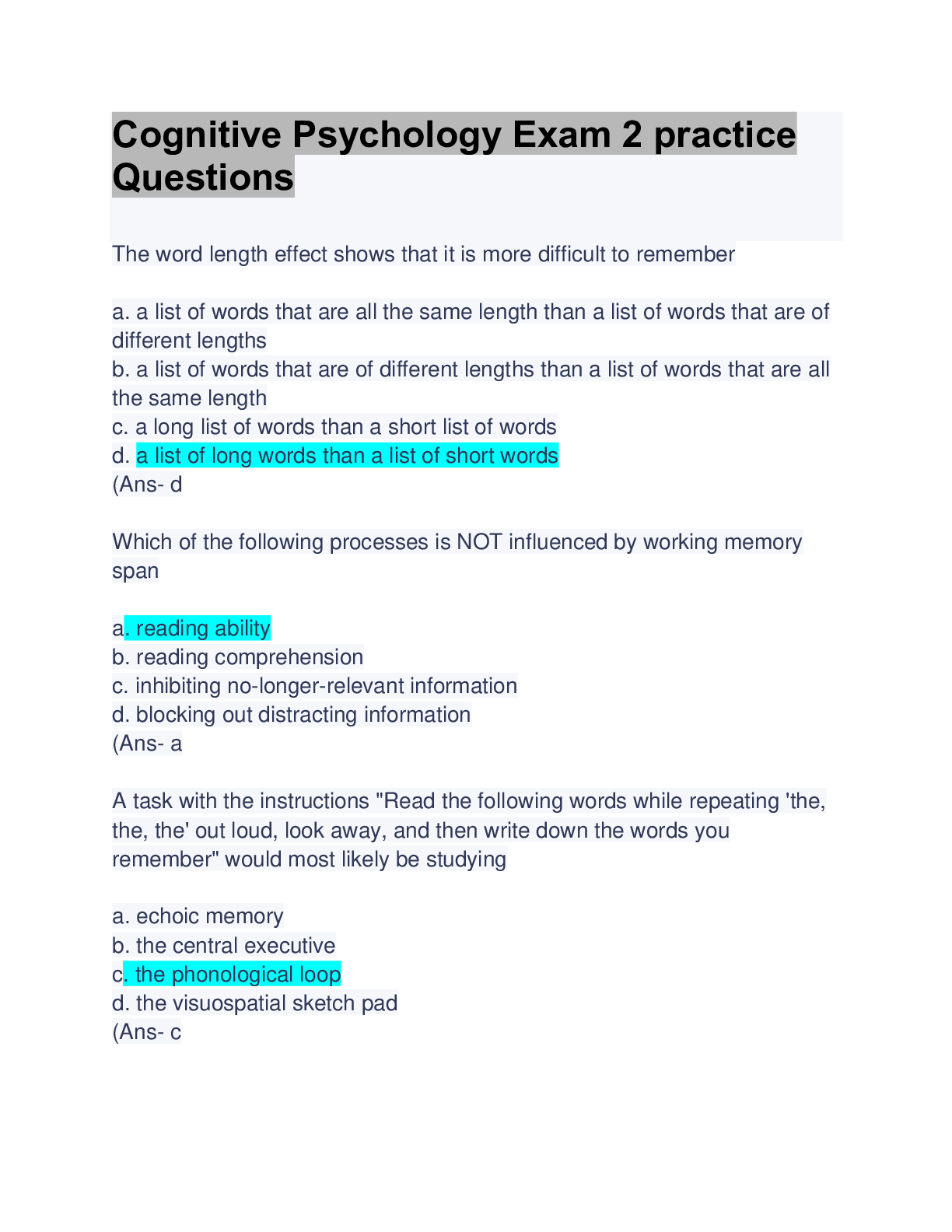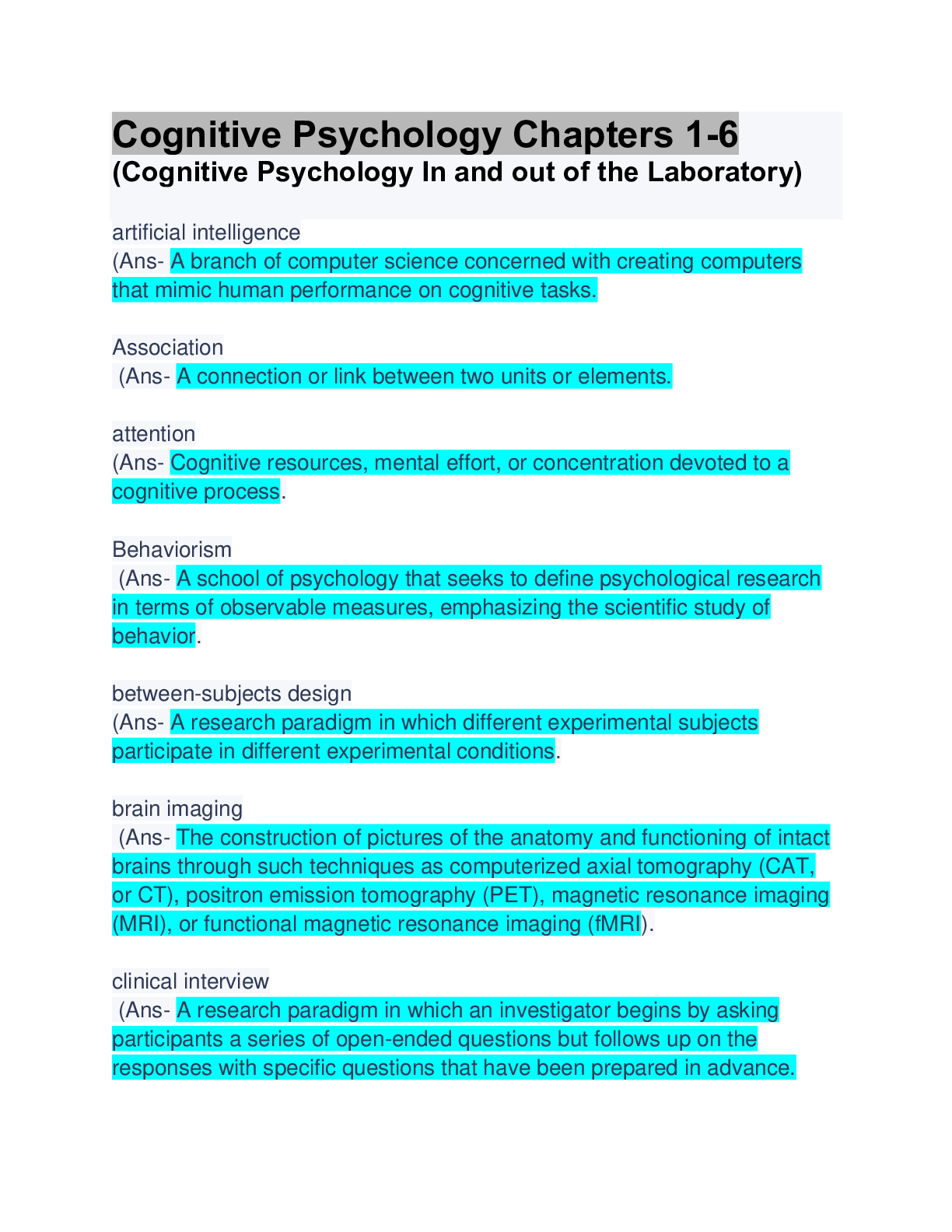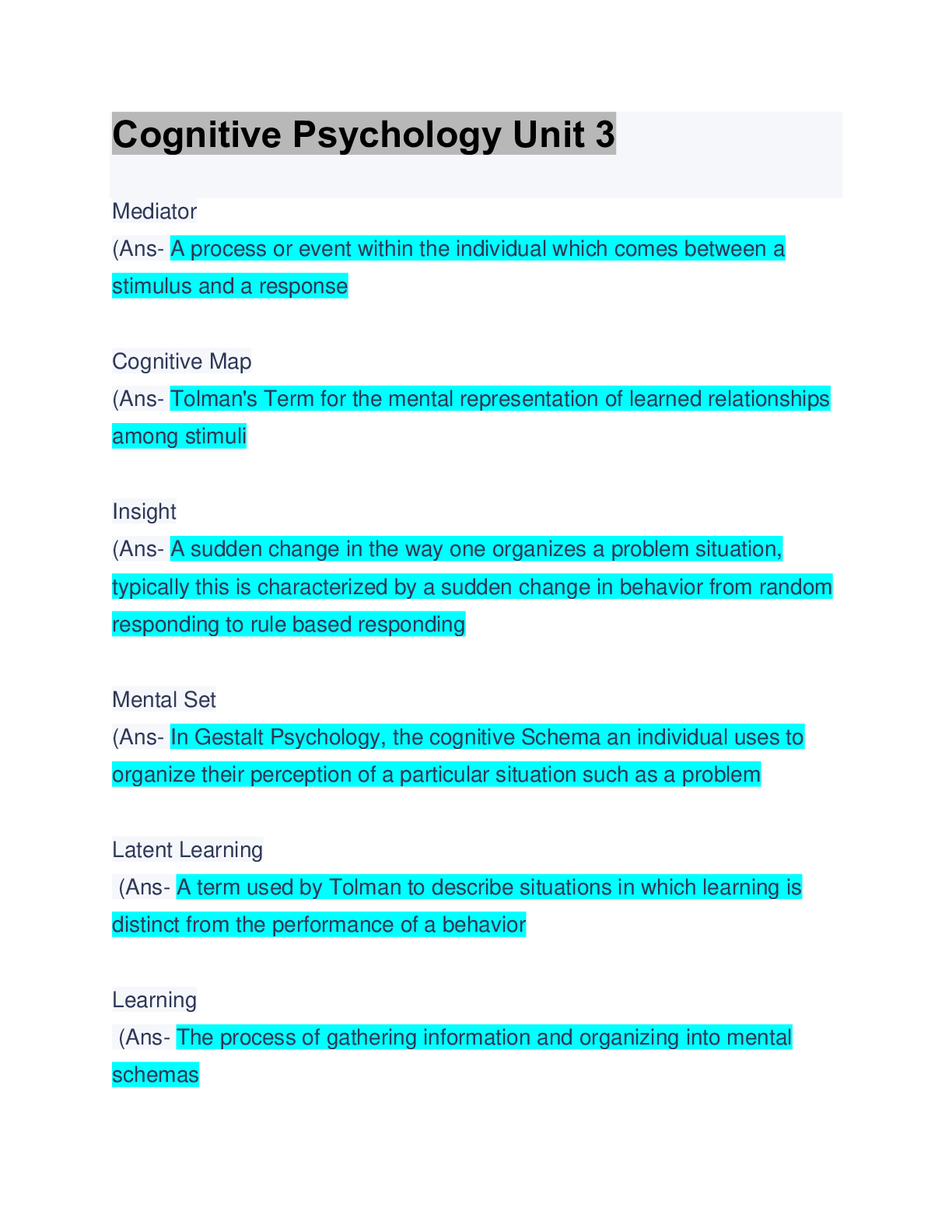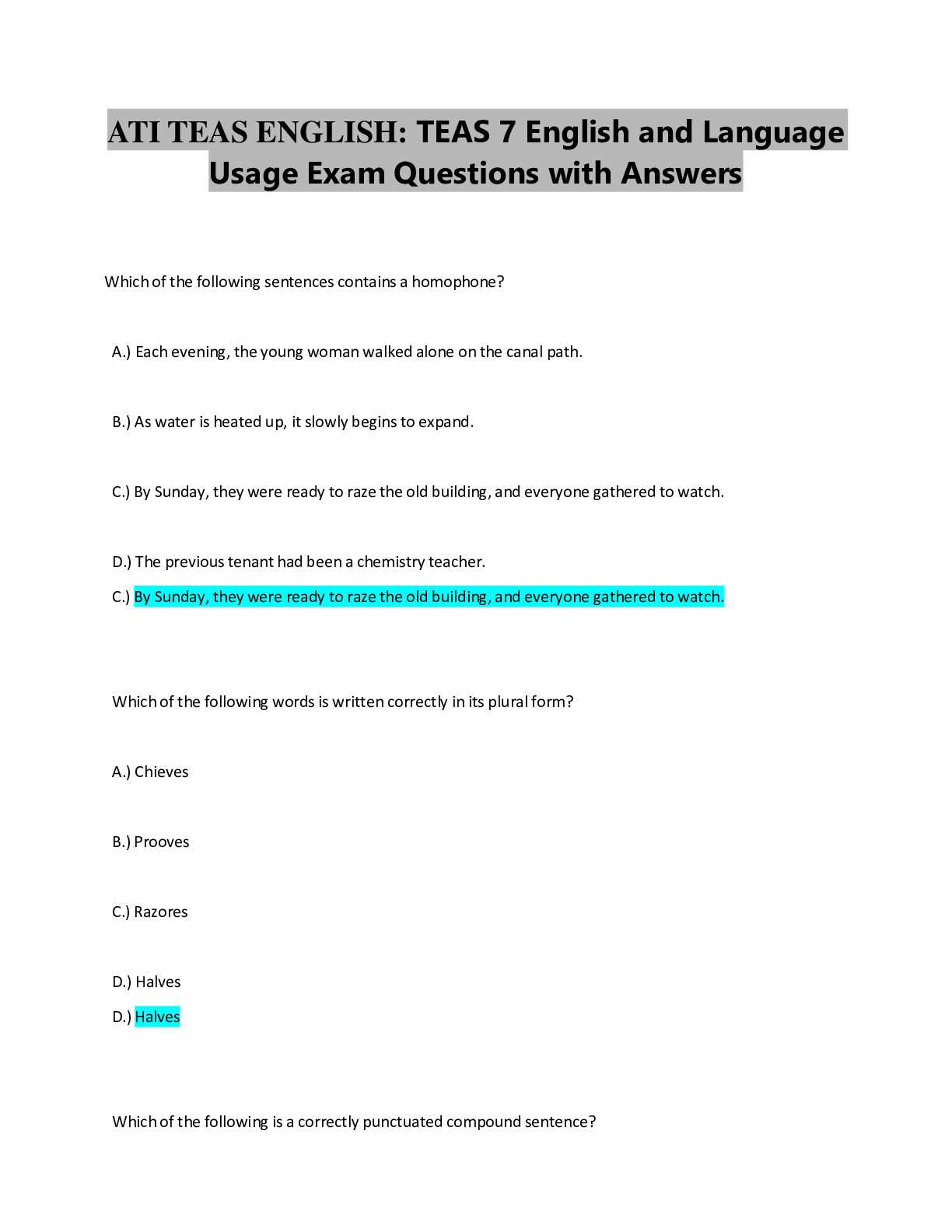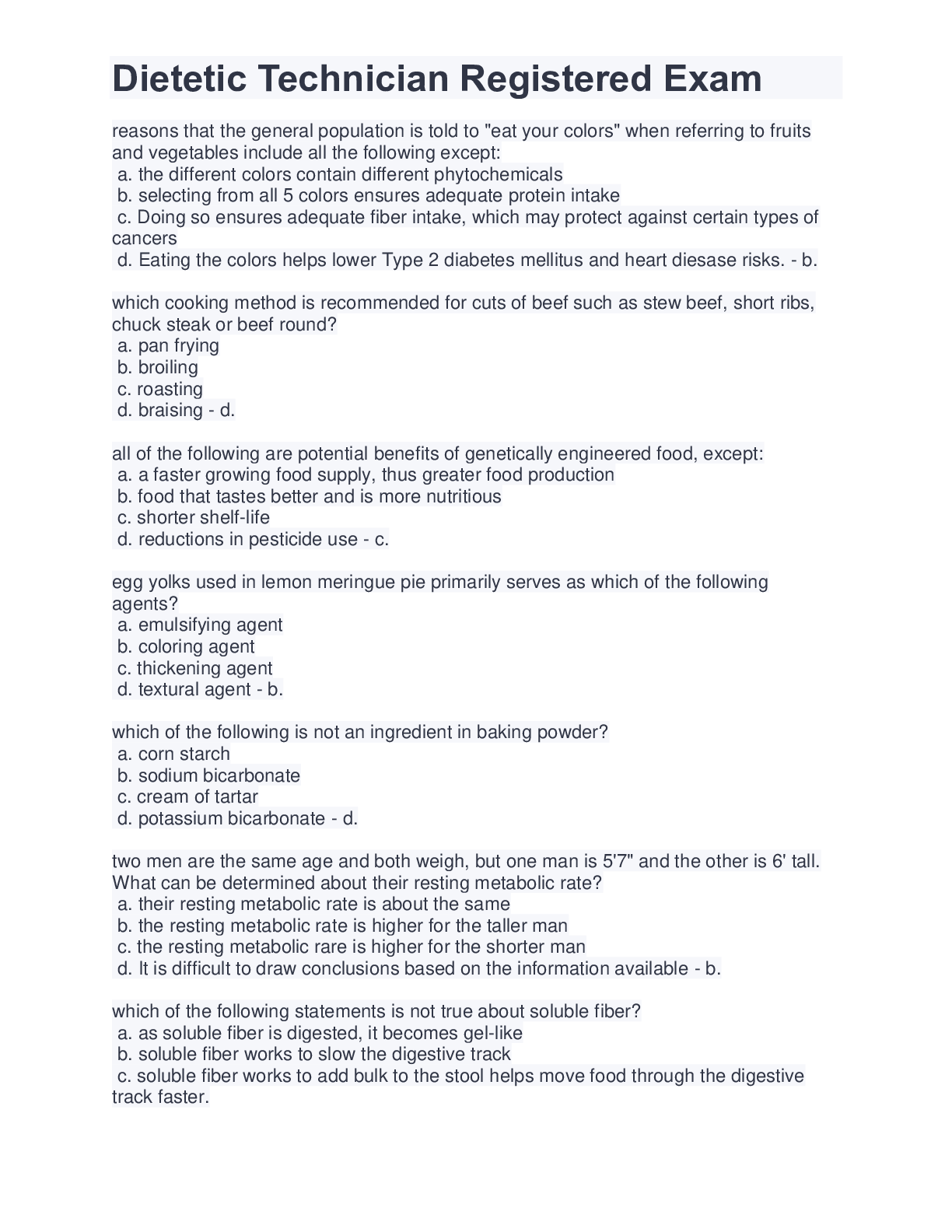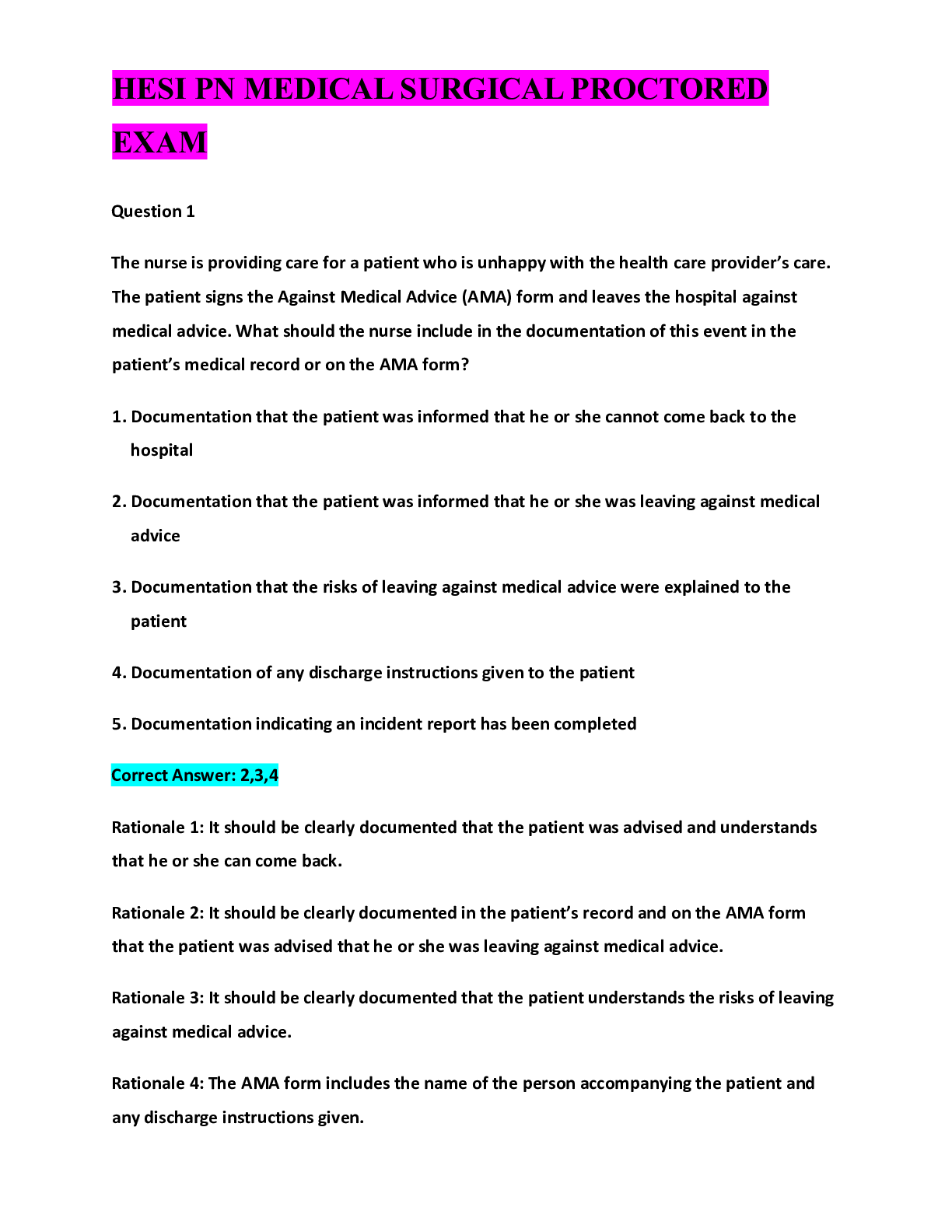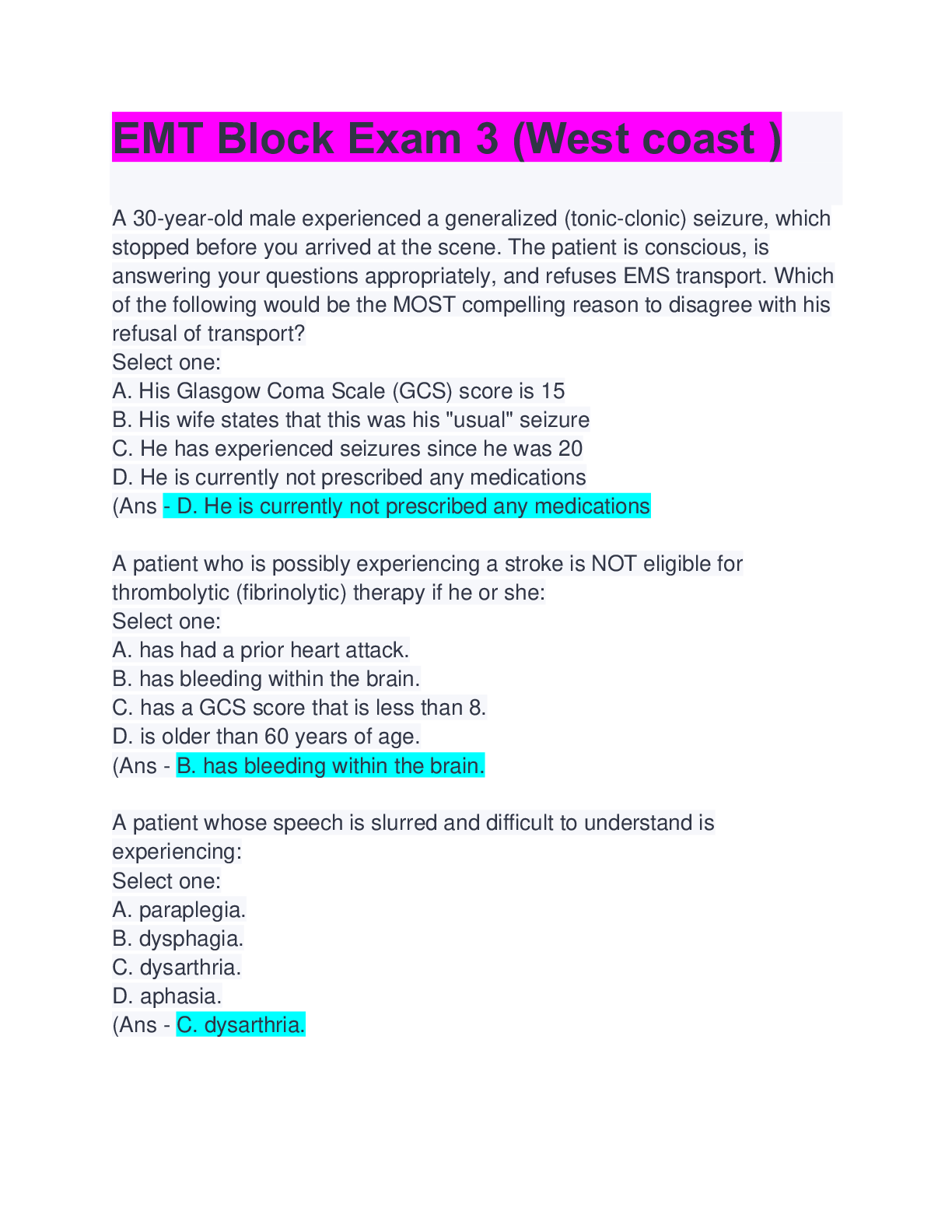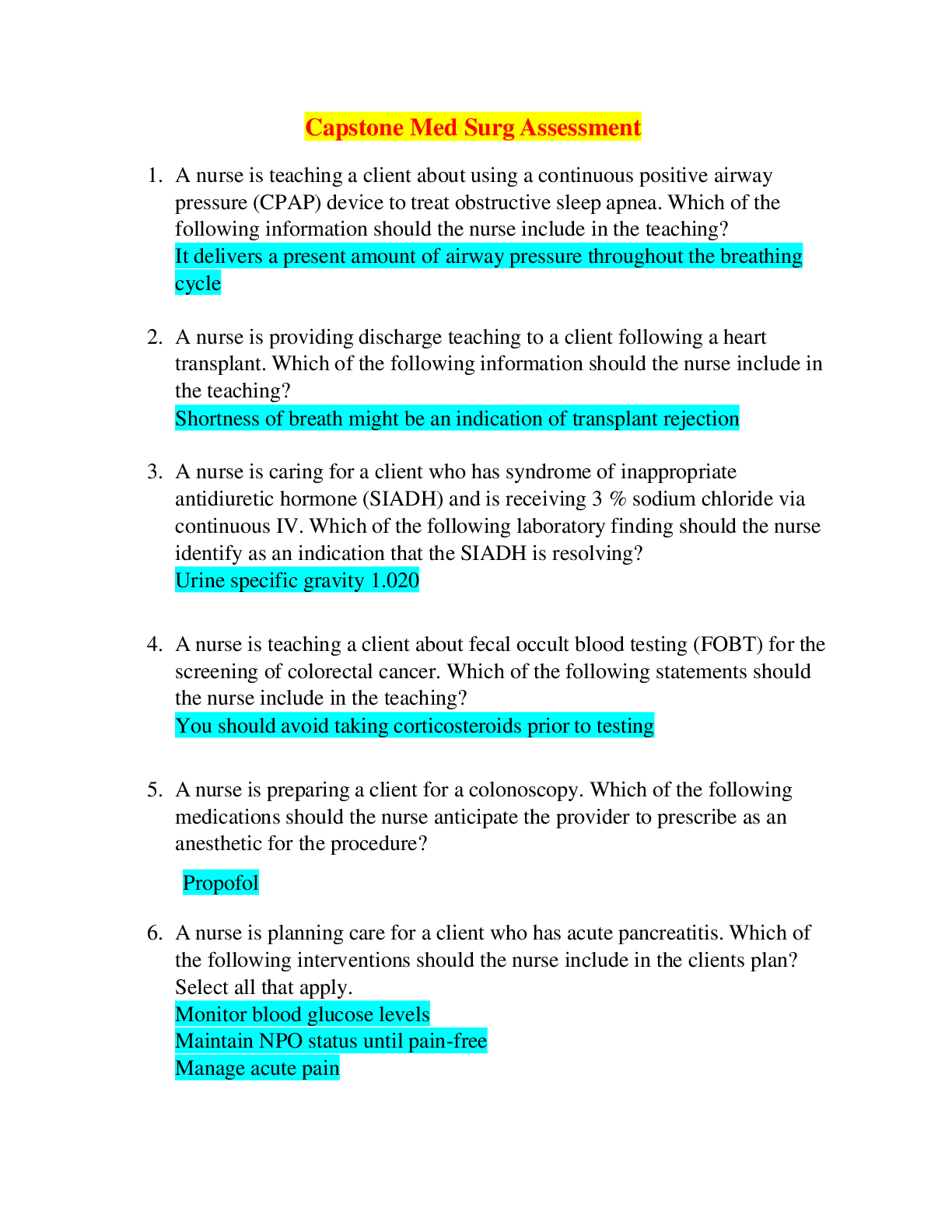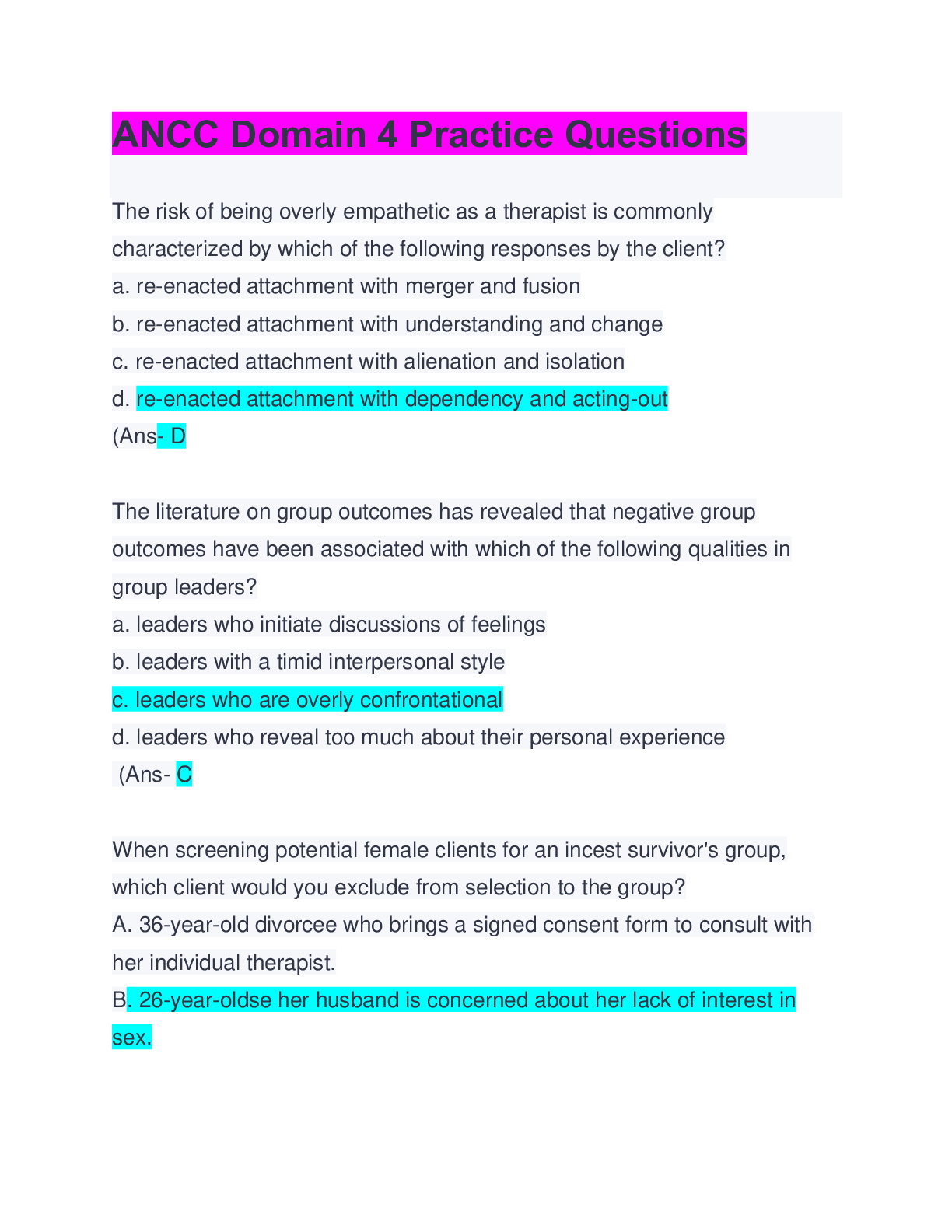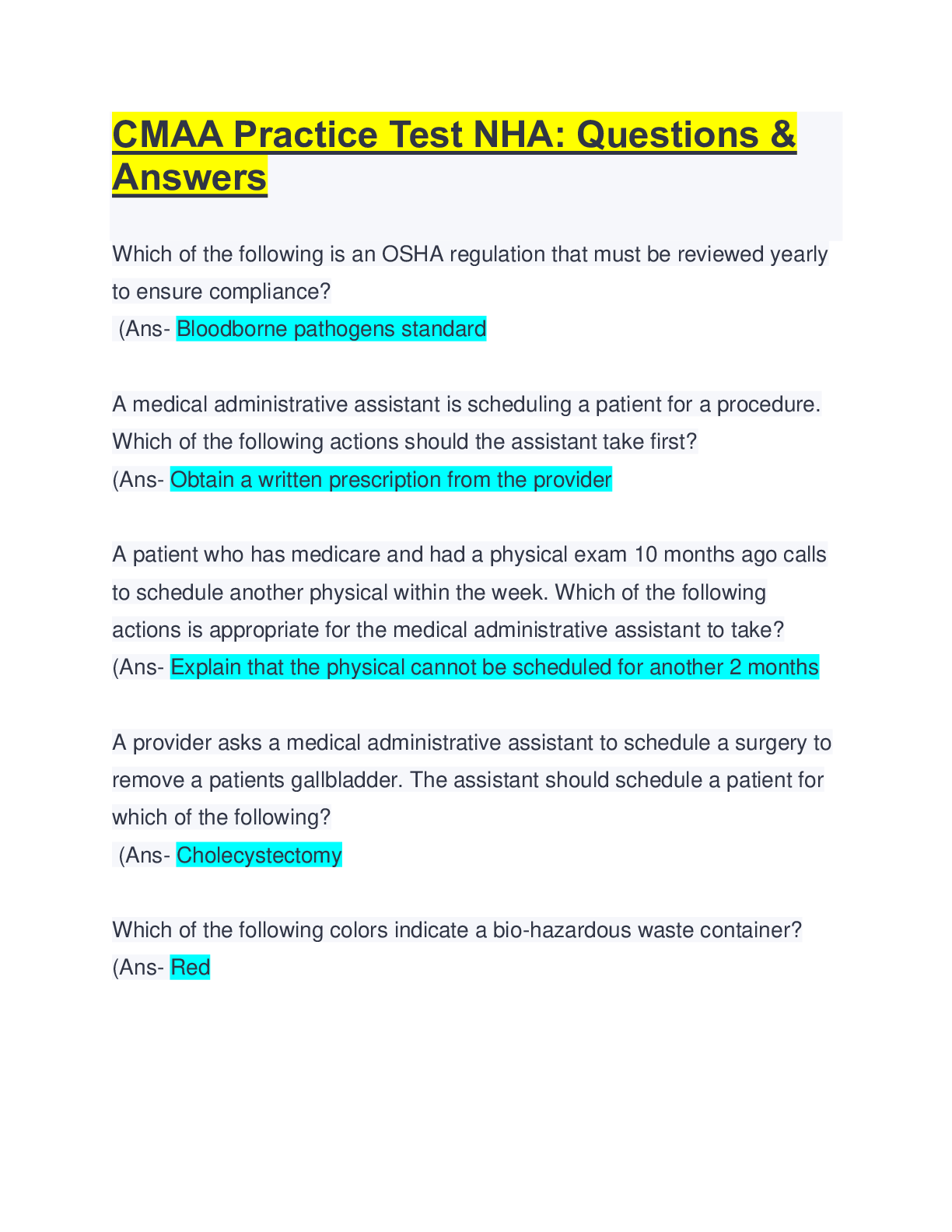Health Care > EXAM > ATI Pediatrics Proctored Exam; ATI Pediatric proctored Exam review: Questions & Answers: Latest Upd (All)
ATI Pediatrics Proctored Exam; ATI Pediatric proctored Exam review: Questions & Answers: Latest Updated: A+ Guide Solution.
Document Content and Description Below
What is a normal apical heart beat for a newborn? (Ans- 110-160 BPM Normal relationship values for head circumference and chest circumference (Ans- Head no greater than 2cm than chest Gestat... ional age (Ans- From conception to birth time spent in utero output for a preterm infant I & O (Ans- 1-3 ml per kg per hr Ventriculoperitoneal shunt (Ans- Drainage tube allows fluids to move to another part of body absorbed or secreted once moved Characteristics of down syndrome (Ans- closed set eyes, single line creases on hand, protruding tongue, curved small fingers high risk for deformed heart What age is a unilateral cleft lip repair usually done? (Ans- 3 months When is the best time to test PKU (Ans- 2-3 days after birth Age groups (Ans- Neonate- birth to 4 weeks Infant-1 month - 1 year Toddler 1-3 years Preschool 3-6 years School age 6-12 years Adolescent 12-18 years New born height/length (Ans- 20 inches, after a year it is 30 inches Sleep requirements per age group (Ans- Neonate 16-18 hours Toddler 10 hours plus nap School age 10-13 hours Adolescent 8 1/2-10 hours When would you assess a deviation from the denver growth chart (Ans- 2 or more percentiles How long would you use the denver developmental screening (Ans- Up to 6 years of age Piaget (Ans- 0-2 years sensorimotor reflex responses 2-7 years preoperational egocentric/language/ limited reasoning 7-11 years concrete operations reasoning r/t own/cause and effect 11-16 formal operations abstract thinking problem solving Kohlberg (Ans- 0-4 years preconventional cannot distinguish right from wrong 4-7 years preconventional rewards based on behavior obedience due to fear 7-11 conventional conformity, loyal 12 plus post conventional moral values develop and conscience Erikson (Ans- 0-1 trust vs mistrust basic needs 1-3 autonomy vs shame and doubt toilet training beginning language 3-6 initiative vs guilt explore environment and body 6-12 industry and inferiority gain recognition from accomplishments 12-18 identity vs role confusion gain independence respect different opinions Freud (Ans- 0-1 oral explore by mouth 1-3 anal toilet training 3-6 phallic aware of self as sexual being 6-12 latent same sex peer relationships 12-18 genital explore sex with others Dental age group 0-3 months (Ans- GI system immature fat and cholesterol needed, breast milk Dental age group 4-6 months (Ans- Able to digest some complex carbs rice cereal first solid. Fruit and veggies one at a time new ones every 4-7 days dental age group 6-8 months (Ans- first tooth dental age group 1 year (Ans- introduce whole milk, 3 meals per day with snacks finger foods, 6 teeth, first dental visit Dental age group 2-6 years (Ans- picky eaters 1 tablespoon per year of food 20 baby teeth are in, first permanent tooth at 6 dental age group 6-12 (Ans- protein and calcium are needed, allow food choices from child Types of play age group 0-1 (Ans- visual and touch types of play age group 1-2 (Ans- parallel play next to each other but not with each other types of play age group 3-5 (Ans- cooperative or associative intimate with mother or father box used for play house types of play age group 5-7 (Ans- symbolic groups secret clubs and groups types of play age 7-10 (Ans- competitive teams win/lose with rules types of play age 10-13 (Ans- team sports internet types of play age 13-18 (Ans- fantasy cliques Infant age group (Ans- depth perception not developed until 6 years old. Object permanence peak aboo they really think you are gone Piaget sensorimotor Kohlbebrg preconventional cannot distinguish right from wrong Freud oral places everything in mouth Erikson trust vs mistrust consistency needed, respond promptly to needs Car seat rule rear facing until 1 year and 22 lbs feed breast every 2 hours formula every 3-4 hours Development 2 months (Ans- kicks legs follows objects smiles posterior fontanelle closes Development 3 months (Ans- holds objects moves hand to mouth grasp reflex development 4 months (Ans- teething begins introduce rice cereal sits with support holds objects in hands development 5 months (Ans- begins to drink from sippy cup diluted fruits except orange places objects in mouth recognizes familiar persons babbles to self development 6 months (Ans- solid foods introduced one food at a time every 4-7 days completely turns over sits alone bangs objects pacifier in crib Development 7 months (Ans- pureed fruit on a spoon baby teeth erupt crawls fears strangers transfers objects from one hand to the other development 8 months (Ans- eats pureed veggies and fruit jumps while held pincer grasp develops grasps with thumb and index likes to swing and ride development 9 months (Ans- feeds self finger foods crawls on all 4s stands while holding on pulls on objects separation anxiety distract rather than punish development 10 months (Ans- drinks from cup walk while holding on knows name when called development 11 months (Ans- understands simple directions plays with toys development 12 months (Ans- feeds self with spoon, stands alone may walk a few steps, shows emotion birth weight triples What incidences prevent mothers from breastfeeding (Ans- Galactosemia, PKU, HIV, chemo, illicit drugs, TB Wrong formula given to infant is considered what (Ans- med error Laleche league encourages what? (Ans- longer breast feeding VS of infant (Ans- HR 110-160 RR30-60 BP 72-104 systolic and 37-56 diastolic Characteristics of a toddler 1-3 years (Ans- Develop self control, toilet training, feeds and dresses self "no" to control environment Erikson-autonomy vs shame and doubt Piaget preoperational egocentric kohlberg preconventional cannot distinguish right from wrong freud anal Motor development of toddler (Ans- 1 year- walking, holds cup and spoon, stacks 2 blocks 2 years-runs, jumps with both feet, undresses self, stacks 6-7 blocks 3 years hops, climbs stairs, rides tricycle, copies shapes Language development of toddler (Ans- 1 years uses one word follows simple commands 2 years uses 2 word sentences uses "no", names and points to objects, likes and dislikes 3 years uses 3 words sentences understands pronouns asks "why" imitates mother and father imaginary friends common [Show More]
Last updated: 2 years ago
Preview 1 out of 38 pages

Buy this document to get the full access instantly
Instant Download Access after purchase
Buy NowInstant download
We Accept:

Reviews( 0 )
$10.00
Can't find what you want? Try our AI powered Search
Document information
Connected school, study & course
About the document
Uploaded On
Nov 29, 2022
Number of pages
38
Written in
Additional information
This document has been written for:
Uploaded
Nov 29, 2022
Downloads
0
Views
223


